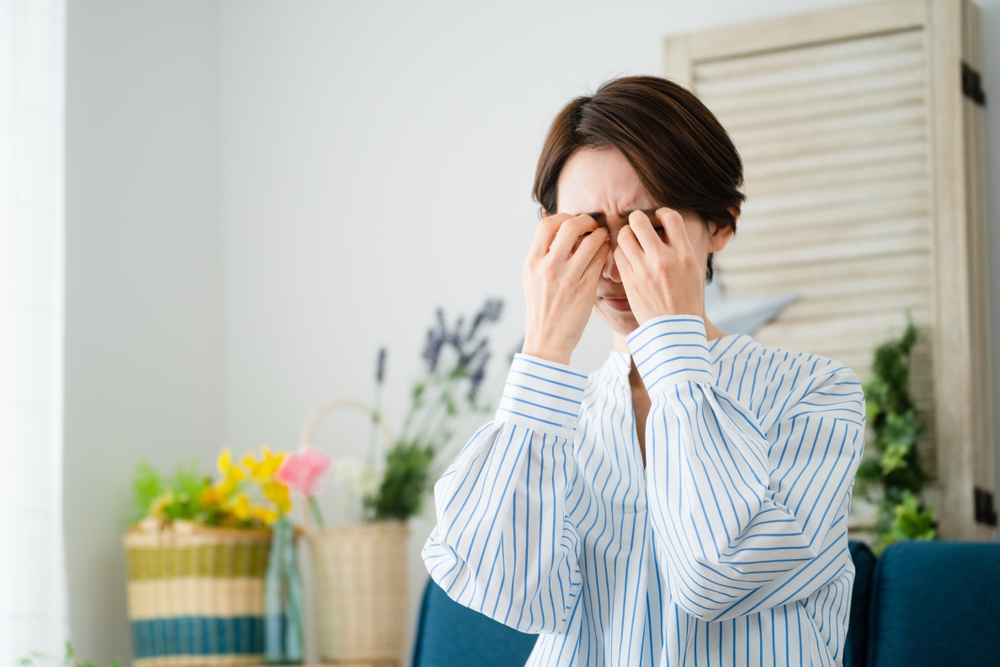
If you live in Greenfield, Indiana, you know how quickly seasonal changes can stir up allergy symptoms, especially when it comes to your eyes. Many of our patients experience itchy, watery, or burning eyes during spring and fall and wonder whether it’s allergies, dry eye, or both. While these conditions often feel similar, they have different causes. Understanding how they overlap is key to finding lasting relief and protecting your long term eye health.
What Are Eye Allergies?
Eye allergies (also known as allergic conjunctivitis) occur when your eyes react to allergens like pollen, dust, pet dander, or mold. These allergens trigger your immune system, causing symptoms like:
• Itchy, red eyes
• Watery discharge
• Swollen eyelids
• Burning or stinging sensation
These symptoms often flare up during certain seasons or when exposed to specific triggers.
What Is Dry Eye?
Dry eye syndrome happens when your eyes don’t produce enough tears or the right kind of tears to keep the surface of your eye properly lubricated. This leads to symptoms such as:
• Stinging or burning
• Grittiness or foreign body sensation
• Blurry vision that comes and goes
• Eye fatigue
• Sensitivity to light
Dry eye can be caused by a variety of factors, including age, hormonal changes, screen time, contact lens wear, medications, meibomian gland dysfunction, blepharitis, and environmental factors like wind or dry air.
How Allergies Can Make Dry Eye Worse
While eye allergies and dry eye are different conditions, they can occur together and unfortunately, one can make the other worse. Allergies increase inflammation in the eyes, which can destabilize your tear film and reduce tear quality.
Additionally, frequent rubbing of itchy eyes can further irritate the ocular surface, making dry eye symptoms more severe. Many over-the-counter allergy drops also contain preservatives that may worsen dryness with frequent use.
What You Can Do at Home
If you’re experiencing symptoms of either (or both) conditions, here are a few self-care tips that may help:
• Use preservative-free artificial tears to keep your eyes moist without added irritation.
• Apply cold compresses to reduce itchiness and swelling.
• Limit exposure to allergens by keeping windows closed, using air filters, and washing your hands and face after being outside.
• Avoid rubbing your eyes, even if they’re itchy - it only makes the inflammation worse.
• Take frequent screen breaks to reduce digital eye strain that contributes to dryness.
When to See Your Doctor
If your symptoms persist, it’s time to see an eye care professional. At Wilson Eyecare Professionals, we provide comprehensive exams to determine whether your symptoms stem from allergies, dry eye, or both. Proper diagnosis is key to creating an effective treatment plan.
Our personalized approach may include:
• Prescription eye drops that reduce inflammation or boost tear production
• Allergy testing or treatment for long-term control of eye allergies
• In-office treatments like IPL (Intense Pulsed Light Therapy), which addresses one of the root causes of dry eye (meibomian gland dysfunction) by reducing inflammation and improving tear film quality. IPL is especially beneficial for patients who suffer from both dry eye and allergic symptoms, offering longer-lasting relief than eye drops alone.
Finding Relief Starts with the Right Diagnosis
Dealing with irritated eyes can be frustrating, especially when you're not sure what's causing your symptoms. Whether it's allergies, dry eye, or a combination of both, getting a clear diagnosis is the first step toward lasting comfort. With the right care, it's possible to reduce inflammation, restore moisture, and improve your overall eye health.
If you’re experiencing ongoing dry eye and allergic symptoms, schedule a consultation with Wilson Eyecare Professionals for a treatment plan that fits your needs. Visit our office in Greenfield, Indiana, or call (317) 477-3937 to book an appointment today.






